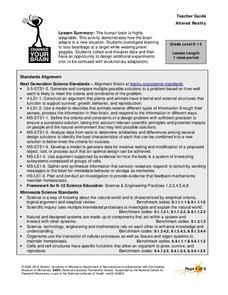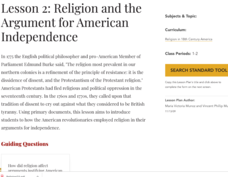Early Childhood Learning and Knowlege Center
My Body My Senses
In a comprehensive unit of activities, learners explore the five senses. Youngsters discover the many different body parts and their functions that allow humans to have sense of sight, touch, smell, taste, and hearing. The best way to...
Washington Office of Superintendent of Public Instruction
Using Our Senses to Observe
Look around and explore. Little ones use their five senses with some day-to-day activities designed to guide observation and apply STEM strategies. Young scientists learn through comparing/contrasting and observing with magnifiers as...
Nemours KidsHealth
Human Body Series - The Five Senses
Get your class up and moving with these engaging hands-on-activities that target their five senses. Children explore four different work stations that require them to look, smell, hear, touch, and taste as they record their responses...
University of Minnesota
Welcome To Your Senses
Sound, sight, taste, touch, and smell—oh the world of senses! What do these five senses have to do with the brain? The answer: everything. Explore how the brain sends and receives messages by having the class participate in several sense...
Core Knowledge Foundation
The Human Body—Systems and Senses Tell It Again!™ Read-Aloud Anthology
Nine lessons over three weeks explore the human body through read-alouds. Third graders listen to and discuss a reading followed by extension activities, including word work and comprehension practice. Learners draft a narrative essay.
University of Minnesota
Attention and Sensory Processing
Ever wondered how your brain manages all of the information it receives every second of every day? The sights, the sounds, the smells ... each one filed away for later use or moved to the front of the line so your body can react. Through...
Hachette Children’s Group
Our Five Senses
Show your class how to experience their world with the five sense. With worksheets on each sense, learners investigate their surroundings and categorize them into sight, smell, touch, hearing, and taste.
Space Race
Sensory Detectives
Test your learners' sensory awareness with three hands-on activities that ask pupils to use their other senses to identify and describe everyday objects hidden from sight.
Child Care Lounge
Learning Foundations Curriculum
Here is a collection of activities that complements each of the five senses. Youngsters explore textures, sounds in song, food tastes and aromas, colors and patterns, and a variety of experiences that boost individuals' knowledge about...
K20 LEARN
Sweet and Savory Writing: Descriptive Writing
The engagement is in the details. Young scholars learn the benefit of weaving descriptive and sensory details into the fabric of their writing through the activities in this lesson. As their hands explore items concealed in bags, a...
Las Cumbres Observatory
Astronaut Training: Taste
Gravity isn't the only thing astronauts lose in space. Learners investigate why astronauts complain about a loss of taste while in space in a hands-on activity. They taste test foods while limiting their other senses and rate each food...
Museum of Disability
Taking Visual Impairment to School
What is the world like when you can't see, or when your vision is impaired? Learn about how Lisa communicates with the world around her with Taking Visual Impairment to School by Rita Whitman Steingold. Learners answer discussion...
PBS
Blow the Roof Off!
Blow the minds of young scientists with this collection of inquiry-based investigations. Based on a series of eight videos, these "hands-on, minds-on" science lessons engage young learners in exploring a wide range of topics from making...
Curated OER
The Metamorphosis: Problematic Situation
Are you enjoying the use of all five senses? Imagine that you have to lose one of them; you can choose which one, but it's gone forever. Work through a lesson based on Franz Kafka's The Metamorphosis that asks class members to rank their...
NOAA
Journey to the Unknown
What's it like to be a deep-sea explorer? Tap into the imaginations of your fifth and sixth graders with a vivid lesson, the second part of a six-part adventure. Learners close their eyes and submerge themselves in an expedition aboard...
University of Minnesota
Altered Reality
Fascinate young life scientists by showing them how their brain learns. By using prism goggles while attempting to toss bean bags at a target, lab partners change their outlook on the world around them, producing amusing results....
Alabama Learning Exchange
Nature's Life Cycle
Become a member of the Pollution Patrol and stand up to litter! After discussing the life cycle of seeds and discussing how plants figure into the food chain, young conservationists engage in several activities involving podcasts,...
Curated OER
How Do Authors Use Imagery to Shape Their Writing?
Esther Forbes' award-winning Revolutionary War novel, Johnny Tremain and excerpts from Julie Otsuka's When the Emperor Was Divine are used to model how imagery brings alive the setting of a story. The young writers then craft their own...
NASA
Lights on the International Space Station
Groups explore illumination with NASA's Lighting Environment Test Facility (LETF) as a context. Using the TI-Nspire app, groups determine the lux equation that models their simulation. They then use the lux equation to solve problems...
Mathematics Vision Project
Module 8: Probability
It's probably a good idea to use the unit. Young mathematicians learn about conditional probability using Venn diagrams, tree diagrams, and two-way tables. They also take into consideration independence and the addition rules.
National Endowment for the Humanities
Lesson 2: Religion and the Argument for American Independence
Young scholars examine how religion affected arguments justifying American independence. They read and analyze primary source documents, and write an essay analyzing how Americans used religious arguments to justify revolution against a...
American Psychological Association
Developing Adolescents
Why to young people act the way they do? Scholars investigate the stages of adolescent development incorporating high school psychology techniques. Using research from the American Psychological Association, they uncover the five areas...























